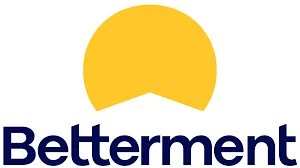The company is registered with the SEC and is a fiduciary, meaning it is legally obligated to act in the best interests of its clients. Betterment offers taxable accounts, IRAs, and cash management services. It also provides features such as tax-loss harvesting, rebalancing, and goal-based investing, making it a strong option for passive investors.
| Feature | Details |
| Founded | 2008 |
| Regulation | SEC, FINRA |
| Account Types | Taxable accounts, IRAs |
| Minimum Deposit | $10 |
| Deposit Methods | Bank transfer, wire transfer |
| Withdrawal Methods | Bank transfer |
| Trading Platforms | Web, Mobile App |
| Best For | Passive investors, beginners |
Betterment’s ease of use and automation make it a strong choice for investors who prefer a hands-off approach. However, it may not be suitable for those looking for advanced trading tools or direct stock investments.
Minimum Deposit and Payment Methods
Betterment has a low barrier to entry, requiring a minimum deposit of just $10 to start investing. This makes it highly accessible for beginners and small investors. Unlike traditional brokers, Betterment does not require a high initial balance, making it easy to start with minimal capital.
Deposit Methods and Processing Time
Investors can fund their accounts through the following methods:
- Bank Transfer (ACH): The most common method, taking 1-2 business days to process.
- Wire Transfer: Faster than ACH but may incur fees from the sender’s bank. Typically processed within 1 business day.
Betterment does not currently support credit/debit card deposits or third-party payment processors like PayPal.
Withdrawal Methods and Processing Time
Withdrawals from Betterment are processed via bank transfer, typically taking 4-5 business days. Unlike traditional brokers, Betterment does not charge withdrawal fees, but bank fees may apply if using wire transfers.
Overall, Betterment’s deposit and withdrawal process is straightforward and cost-effective for most users. However, the lack of instant funding options may be a drawback for those who need quick access to their funds.
Security and Regulation
Betterment is a highly regulated investment platform, ensuring a secure environment for investors. The company is registered with the U.S. Securities and Exchange Commission (SEC) and is a member of the Financial Industry Regulatory Authority (FINRA). As a fiduciary, Betterment is legally required to act in the best interests of its clients.
Investor Protection
Betterment provides several layers of security to safeguard client funds and personal information:
- SIPC Protection: Betterment accounts are covered by the Securities Investor Protection Corporation (SIPC), which protects up to $500,000 per customer (including up to $250,000 for cash). This protection does not cover investment losses due to market fluctuations.
- Bank-Level Encryption: The platform uses 256-bit SSL encryption to protect sensitive data.
- Two-Factor Authentication (2FA): Users can enable 2FA for additional login security, reducing the risk of unauthorized access.
- Fraud Monitoring: Betterment actively monitors accounts for suspicious activity and has measures in place to prevent fraud.
While Betterment offers strong security features, it is important to note that it is not a bank. Cash holdings in Betterment Checking and Cash Reserve accounts are FDIC-insured up to $2 million, but investment accounts are subject to market risks.
Trading Platforms and User Experience
Betterment offers a streamlined and user-friendly trading experience, primarily focusing on automated investing rather than active trading. The platform is designed to be accessible through web and mobile applications, ensuring a seamless experience across devices.
Available Trading Platforms
- Web Platform: Accessible via any browser, offering full functionality, including account management, goal setting, and portfolio tracking.
- Mobile App (iOS & Android): A well-optimized app with features like account monitoring, deposit management, and portfolio adjustments.
Betterment does not provide advanced trading software, as its main focus is on long-term automated investing. Unlike traditional brokers, it does not support MetaTrader (MT4/MT5), cTrader, or proprietary desktop platforms for manual trading.
Key Features
- Automated Portfolio Management: Users set investment goals, and Betterment automatically allocates funds based on risk tolerance.
- Tax-Loss Harvesting: Helps investors reduce tax liabilities by selling assets at a loss to offset gains.
- Rebalancing: Portfolios are periodically rebalanced to maintain the target asset allocation.
While the lack of advanced trading tools may not appeal to active traders, Betterment’s intuitive interface and automation make it an excellent choice for passive investors.
Betterment Account Types
Betterment offers a range of account types designed for long-term investors. Unlike traditional brokers, it does not provide margin accounts or active trading options. Instead, it focuses on automated portfolio management, making it an attractive choice for passive investors.
Available Account Types
- Individual and Joint Taxable Accounts – Standard investment accounts for individuals or shared ownership with a partner.
- Traditional IRA – A tax-deferred retirement account that allows contributions to grow without immediate tax liability.
- Roth IRA – A retirement account where contributions are made with after-tax income, and withdrawals are tax-free in retirement.
- SEP IRA – Designed for self-employed individuals and small business owners, offering higher contribution limits.
- Trust Accounts – Allows users to invest under a legal trust structure for estate planning purposes.
- Cash Reserve & Checking Accounts – FDIC-insured accounts for holding cash and managing everyday transactions.
Which Account is Right for You?
- If you want a flexible investment account, a taxable individual or joint account is ideal.
- For retirement savings, a Traditional or Roth IRA offers tax advantages depending on your financial situation.
- If you are self-employed, a SEP IRA allows for higher contributions.
- Those looking for estate planning may benefit from a trust account.
Betterment’s account options cater to investors at different stages of their financial journey, making it easy to find a suitable plan.
Pros and Cons of Betterment
Before deciding whether to use Betterment, it’s important to weigh its advantages and disadvantages.
Advantages
- Low minimum deposit – Start investing with as little as $10.
- Automated investing – Hands-off approach with goal-based financial planning.
- Tax-efficient strategies – Includes tax-loss harvesting to reduce tax liabilities.
- No withdrawal fees – Unlike traditional brokers, Betterment does not charge for withdrawals.
- FDIC-insured cash accounts – Cash holdings are insured up to $2 million.
Disadvantages
- No active trading – Not suitable for day traders or those wanting direct stock purchases.
- Limited funding options – Deposits and withdrawals only via bank transfer or wire transfer.
- No advanced trading tools – Lacks platforms like MT4, MT5, or cTrader.
- Slow withdrawal process – Bank transfers can take 4-5 business days.
Despite a few limitations, Betterment remains one of the best choices for passive investors seeking automation and tax efficiency.

